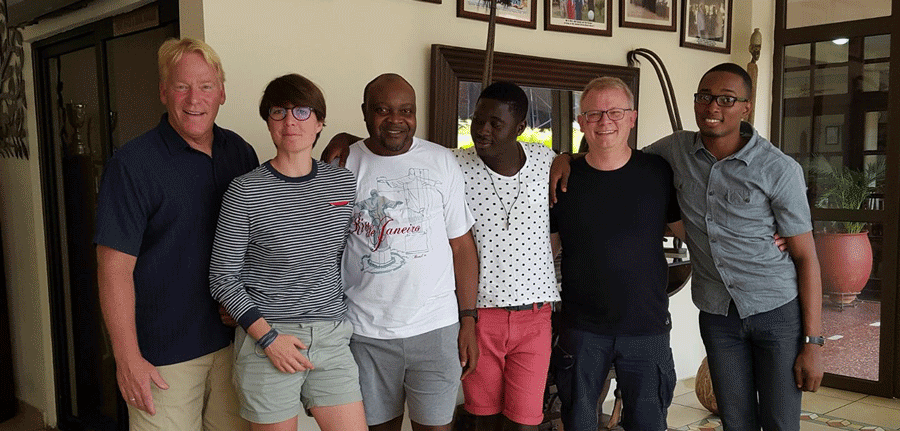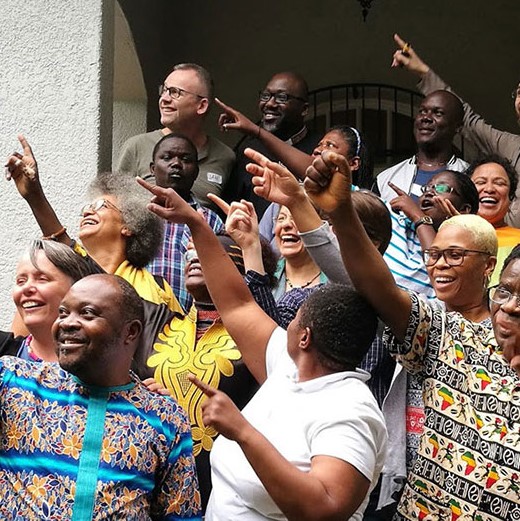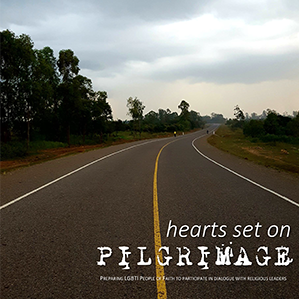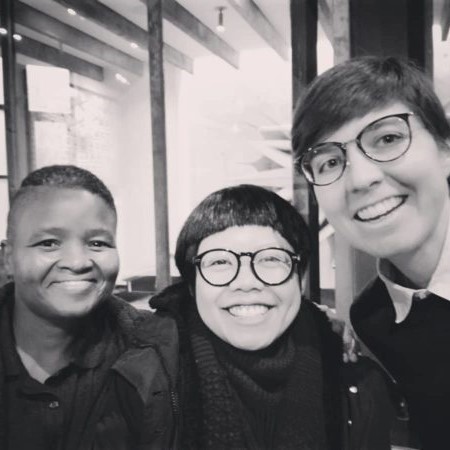GIN member, Davis Mac-Iyalla, third from left above, is an award winning Nigerian Anglo/Catholic gay Christian and founder/director of Interfaith Diversity Network of West Africa. Davis is a well-known gay Christian Activist who has been an advocate for LGBTI rights for over 20 years, a public speaker, researcher and author and is often asked to speak on the plight of LGBT Christians in West Africa. He is currently based in London, UK, his second home after Nigeria, West Africa.
- Could you please let us know a little about the Interfaith Diversity Network of West Africa (IDNOWA)?
We are a regional network of faith-based individuals and activists (anchored in a diverse number of faith traditions). We are also all LGBTIQ people, and our main interest is to advocate and work for the inclusion of diverse persons to create a world that is governed by respect and dignity. We have set up the network so that we can reach out and promote human rights of all persons, through a faith-based perspective.
- Are you a religious person yourself?
Yes – I have always been a person of faith; my family is, I was baptised and confirmed in the Anglican Church. Still today, I am a religious person, well involved within my faith sector. I am an Anglo-Catholic, lay minister, and have also been knighted in the Church.
- And within your own religious practice, do you include other faith traditions and/or spiritualties?
I was raised in West Africa. Growing up as Christian, I realised that, within my own community, there were people who worshipped and practiced their African traditional spirituality. I also had friends in Muslim communities. For me, these two have influenced my beliefs and growing up, I included them in my practice. I do believe that all of us are linked to one supreme God, and this is what has always motivated me to include all faith traditions in my fight for dignity and rights.
- How did the IDNOWA network emerge?
I have always found that – even when I worked as Director of “Changing Attitudes Nigeria”, a Christian-based organization – it was important to think for and include people who have no voices, including Muslims. For this reason, my work has never been exclusively Christian.
And the birth of this network came about in 2015 when Pope Francis called for a Synod on the Family – I found that there were a lot of contributions and stories from Europe, America, and other parts of the world, but I heard no voices from Africa, including West Africa and African Catholic leaders. I then approached the European Forum for LGBT Christian Groups and asked if they could sponsor me to go to West Africa and do interviews of people to record those voices which were not being heard. I thus went to 5 West African countries and I interviewed Catholics first, but found out Muslim and Hindu sisters also wished to be interviewed and so I included them. This is how I got the idea and a vision for organizing an interfaith network in West Africa specifically.
- Where is IDNOWA present in West Africa today?
Now IDNOWA represents 10 countries: Benin, Nigeria, Ghana, Sierra Leon, Liberia, Gambia, Burkina Faso, Ivory Coast, Mali and Togo. Even though I now live in London (UK), I have never lost my ties with West Africa. I am a grassroots person, someone who networks very well, so I kept doing this. I believe that there is no country in West Africa where I have no contact. Therefore, when it came to spreading the world in different localities regarding IDNOWA, it was not a problem, and people quickly responded. We then set up a google group, to continue our conversations, and people kept introducing new people. We then also set up a WhatsApp and skype groups.
- How is IDNOWA deliberately working to include other faith and religious traditions and do you feel that it is working?
Absolutely – there is a language problem in West Africa but we still try to include different faith traditions; Hindu, Muslims, Christians are now working and worshipping together. Unfortunately, we had invited people who practice African traditional spiritualities but they were not available to attend our launch conference. We do hope that later, African traditional worshippers will join the network. One of our core ideas is to include all faith traditions, and now that the conference is ended, we will continue to reach out to different traditions, to work together in solidarity and promote human rights through our faith. And we are also opened to people who do not come from faith traditions, and who wish to work with us, following our vision and values.
- How is IDNOWA deliberately working to include a diverse LGBTI representation?
In the same way, yes, one of the things we try to do is to include people from different sexual orientations, gender identities and expressions. We make sure there is a widespread representation, and we also try to include allies.
- How to you envision the relationship with GIN?
We have always listed GIN as a thought partner. My vision is that GIN has the stability and capacity to support us. I would like for GIN to be more involved within our network and to bring IDNOWA into the struggle for dignity and respect, and to help our new network grow and stabilise itself. We do not see IDNOWA as a partner of GIN but more as its property. I have never seen IDNOWA as separate from GIN but as part of it, and through us, GIN can do more outreach in West Africa, through the members of IDNOWA. This way, it will be easy for GIN to organise and promote support and leadership in this region.
- What are the next steps for IDNOWA?
The next steps are very clear for the network: we have worked with Board members to bring it to a stage of development i.e. after proceeding with the registration process in Ghana, we need now to have structure and members of staff. Personally, I did not have this vision in order to have someone else carry it forward, thus I am planning on becoming the Founding Executive Director of the network. Further, I did not set up a network to run it from the UK – I am planning on going back home, to lead this network, where I already have connections and relationships. We are now talking with the Board, so that I can become the part-time or full-time Director, with Accra (Ghana) as our base.
Afterwards, we will start to run our programmes. There is a lot of religious homophobia in West Africa, and so our presence is crucially needed. So in terms of programs, we are aiming to have dialogue with religious leaders of all faith traditions. Most LGBTI people in West Africa do not have connection with faith leaders – so what I would like to bring in is to foster dialogue and connection between community and faith leaders to build those bridges, and create that safe space. Here, we will make sure that we respond to different needs of each country. For example, in Nigeria, one core issue is that of criminalization. Whereas, in Benin, there is no criminalization but a huge cultural issue of homophobia and transphobia. We therefore plan on consulting with each member country and identifying local core needs.
- Do you have any concluding comments?
We are a very new network, and a lot of GIN members already have achieved a lot. We would love to get support from GIN and its members in terms of information sharing and training, to help us succeed in our endeavour. I do not want GIN to be shy and not talk to us. We would really like GIN to move with us, hand in hand.





